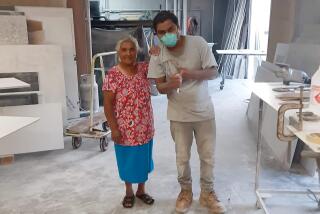State Justices Curb Suits Over Silicone Implants
- Share via
SAN FRANCISCO — Women in California who charge that Dow Corning Corp.’s silicone breast implants caused them health problems may not sue its parent company, Dow Chemical Co., the California Supreme Court ruled Thursday.
The 6-1 decision means that women in California will be limited to sharing in the tentative $3.2-billion deal that Dow Corning announced Wednesday to settle claims from about 170,000 plaintiffs across the country. Women in some states have been able to sue Dow Chemical for additional damages. California women no longer have that option.
“These women have been deprived of their ability to have their claims heard by a jury,” said plaintiffs’ lawyer James Pantone. “Now they are stuck with remedies provided to them by the bankruptcy proceedings.”
Those proceedings began in May 1995, when Dow Corning, a company jointly owned by Dow Chemical and Corning Inc., filed for bankruptcy court protection because of thousands of suits filed by women alleging that its implants made them ill.
In part to get around the limits on the damages that might be collected in those bankruptcy proceedings, women across the country have pursued claims against Dow Chemical. They argued that the company should be held liable because it had performed toxicology tests on silicone in the 1940s and 1950s that had shown potential dangers from the chemical. The company had failed to disclose the dangers posed by silicone compounds, the plaintiffs argued.
Some states have allowed such claims to go forward. In 1995, for example, a Nevada jury awarded $14.1 million to a woman who sued Dow Chemical because she charged that her Dow Corning breast implants made her ill. Dow Chemical’s appeal of that case is before the Nevada Supreme Court. In other states, including New York and Michigan, appellate courts have dismissed similar cases.
Dow Chemical and Dow Corning still insist that silicone implants posed no health risk to women. Dow Chemical cites epidemiological studies by the Harvard Medical School, the Mayo Clinic and other medical centers that have found no increased health risk from silicone breast implants, and no evidence that leakage from the implants damages the autoimmune system.
Lawyers on both sides of the long-running implant litigation said that although the California Supreme Court’s decision directly affects only plaintiffs in the state, it may influence the decisions of the many state high courts that have not ruled on the issue.
Attorneys for the company plan to bring the ruling to the attention of the Nevada Supreme Court, and expect to use it in about 13,000 similar lawsuits pending in other states, said Dow Chemical attorney Michele Odorizzi.
Odorizzi said she was delighted by the ruling. “It certainly means that the cases in California with respect to Dow Chemical are over, finally,” she said.
An estimated 40,000 people have Dow Corning silicone implants--mostly women who had implants to augment or reconstruct their breasts. Suits filed by thousands of women against Dow Chemical were coordinated before a San Diego judge, who dismissed the claims in 1994, saying that Dow Chemical had no duty under California’s liability laws to protect consumers of the implants because it had not tested or designed them. An appellate court upheld that dismissal in September 1996.
The court’s decision did not address the fundamental question of whether silicone implants cause the myriad diseases that some women have charged--including lupus, arthritis and other ailments. It only addressed the question of whether Dow Chemical could be held liable for whatever damage implants might cause.
The court ruled in favor of Dow Chemical on the grounds that at the time the company conducted its research, there was no way to know that silicone compounds would later be used for breast implants, which were first made in 1962.
“Any possible consequence for plaintiffs . . . was exceedingly attenuated and remote” at the time that Dow Chemical conducted its research, Justice Kathryn M. Werdegar wrote for the court. Justice Stanley Mosk was the lone dissenter in the case.
The justices “were very taken with the foreseeability notion--how could you have foreseen the medical uses of silicone in the late 1940s and ‘50s, when the bulk of Dow Chemical’s research was being done?” said Odorizzi, who argued the case before the court.
Dow Chemical maintains that its scientists were testing only for the effect of industrial silicone on workers who might come in contact with it during the manufacturing process, not for its effect on the body if used as an implant.
The California Medical Assn., the California Chamber of Commerce and the Medical Device Manufacturer’s Assn. had submitted briefs to the court siding with Dow Chemical. They argued that a ruling in favor of the women would have a chilling effect on scientific research.
“If you find somebody liable because they did toxicology research on a raw material, are they subsequently liable for every product ever made of it?” Odorizzi asked.
But plaintiffs, their lawyers and their advocates expressed outrage over the ruling.
The California decision “is a tragic setback for women who we believe suffered injury as the result of the manufacturing of a product that Dow Chemical could have helped prevent,” Pantone said.
“It is just one more time a big manufacturer is getting away with murder,” said Cristy Warschaw, who runs a support group, Women in Health, for people with silicone implants in Los Angeles and Orange counties.
The Food and Drug Administration banned silicone implants in January 1992, after women complained that they experienced problems with the devices rupturing and leaking. Saline implants are still widely used for breast augmentation and reconstruction.
More to Read
Inside the business of entertainment
The Wide Shot brings you news, analysis and insights on everything from streaming wars to production — and what it all means for the future.
You may occasionally receive promotional content from the Los Angeles Times.










